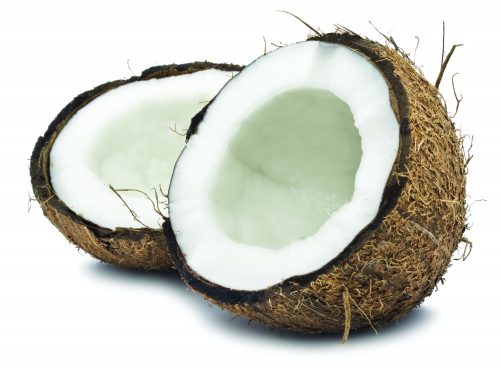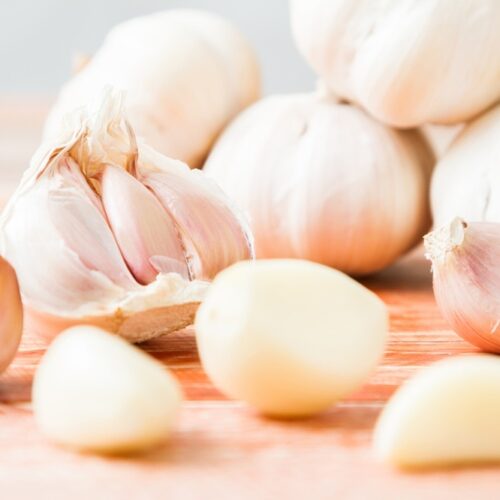
HFG senior nutritionist Rose Carr takes a look at the popular food of the moment: coconut. Which coconut products are worth the money (and the hype)?
Coconut sugar
Coconut sugar is made from the flowers of the coconut palm before they develop into coconuts. So a tree that produces coconut sugar will not produce coconuts. The flowers are cut so they produce a liquid sap and when heated the water in the liquid evaporates to leave the sugar. Also called coconut palm sugar (as the coconut is a palm tree), this should not be confused with what we commonly call palm sugar, which is made from the date palm. Coconut sugar has a pleasant deep, treacle-like flavour.
We think coconut sugar is over-hyped and super-pricey. Producers claim it is packed with vitamins, minerals and amino acids, but unless you are consuming vast amounts of sugar (not recommended!) the amounts of vitamins and minerals in the sugar are insignificant. Amino acids are the building blocks of protein and coconut sugar contains less than 2g protein per 100g. So while a claim that coconut sugar is high in amino acids may sound nice, it’s meaningless when it’s so low in protein to start with. For perspective, one teaspoon of sugar is around 4g and 100g is just less than half a cup. Coconut sugar is more than 90 per cent carbohydrate, mostly sugars.
Our advice is to use whichever sugar you prefer for taste and don’t overdo it, as excess sugar in any form is not healthy.
Price comparison
- 500g Banaban Organic Coconut Sugar: $21.35 ($4.27/100g or 18 cents per teaspoon)
- 400g Ceres Organics Coconut Sugar: $10.15 ($2.54/100g or 13 cents per teaspoon)
- 500g Chelsea Low GI Sugar: $4.15 ($1.04/100g or 6 cents per teaspoon)
- 500g Chelsea White Sugar: $1.91 (39 cents/100g or 2 cents per teaspoon)
Coconut water
Coconut water, an almost clear juice, is harvested from the centre of immature green coconuts.
No, we don’t believe it is going to cure stomach flu, dysentery, constipation, intestinal worms and even wrinkles (to name just a few of the internet claims).
Leaving the misinformation aside, however, there are good things to say about coconut water. One 250ml (1 cup) serve of coconut water contains around 200-220kJ, which is less than half the amount in most fruit juices. Like other fruit juices, coconut water also contains useful amounts of potassium, which is good for blood pressure. Often promoted as a sports drink, it could be used for after-sport hydration, but those serious about their sport and hydration would need to choose a suitable product as some have lower amounts of carbohydrate and sodium than ideal for a sports drink. (See our Guide to sports drinks feature for more information.)
There is nothing magical about coconut water but we like the taste, an important prerequisite, and nutritionally it stacks up just fine.
Price comparison
- King Island 100% Pure Coconut Water: $4.25/1L ($1.07 per 250ml)
- Charlie’s Orange Juice: $3.99/1L ($1.00 per 250ml)
- Fresh Up Apple & Orange Juice: $2.48/1L (62 cents per 250ml)
Coconut milk and coconut cream
Coconut milk and coconut cream are made from the flesh of the mature coconut. The flesh, usually with added water, is ground to a fine pulp and the juice is separated from the pulp, often by pressing. Once settled, the fluid separates into a higher-fat cream and a lower-fat milk. Reduced-fat products have a higher water content. Coconut cream and coconut milk are sometimes homogenised so the fat particles are smaller and texture more even.
Using coconut cream or coconut milk, even those labelled as light versions, can add a whopping amount of fat, saturated fat and kilojoules to a dish. A real trap with these products is that some light versions are higher in fat than another brands’ standard version! So it’s all about picking a lower-fat product or using much less than a recipe might state — often both! It’s the flavour we need, not the saturated fat.
We recommend Trident Light Coconut Milk as a flavoursome lower-fat choice. If you’re cooking a meal for three to four, use the small 165ml can. If you open a larger can, freeze the remainder to use another time. (See also our Guide to coconut milk feature for more information.)
Coconut oil
Like other nut and seed oils, coconut oil may be extracted by cold-pressing the coconut flesh. Coconut oil is usually labelled as virgin or pure coconut oil, although there are no industry standards for naming as there are for olive oils. Coconut oil can also be refined using heat and chemical processes, much like most of our canola, sunflower and other cheaper oils. Whichever you prefer, it’s good to check what you’re getting.
There are many claims about the supposed health benefits of using coconut oil but they have not been substantiated (see Is coconut fat bad? below). Our advice: we prefer to use other fats which are proven to be healthy. If you love the flavour, aim to use it sparingly, as you would with butter.
Price comparison
- Dr Bronner’s Magic “All-one!” Fresh-Pressed Virgin Coconut Oil: $29.95/414ml ($7.20 per 100ml)
- Harvest Coconut Oil (a refined oil from Malaysia): $6.29/320ml ($1.97 per 100ml)
- Cobram Estate Australian Extra Virgin Olive Oil: $6.99/375ml ($1.86 per 100ml)
- Lee Kum Kee Sesame Oil: $5.39/207ml ($2.60 per 100ml)
- Amco Canola Oil: $3.69/450ml (82 cents per 100ml)
Coconut flour
Coconut flour is a by-product of coconut milk production. We like coconut flour because it’s around 40 per cent fibre, mostly insoluble fibre which helps to keep our bowels moving. Just one tablespoon adds over 3g fibre. It also adds 0.7g saturated fat so we don’t recommend using more than a couple of tablespoons per serve.
Coconut flour can be used to add fibre to smoothies, pancakes and baking. Being so high in insoluble fibre, coconut flour will absorb liquid, so when using it we need to add liquid as well. As an example, if your recipe calls for two cups of flour in total you could substitute up to half a cup with coconut flour and add half a cup of water or milk as well.
Price comparison
- 800g Ceres Organics Coconut Flour: $7.99 ($1.00 per 100g)
- 750g Macro Gluten Free Plain Flour: $5.49 (74 cents per 100g)
- 1kg Edmonds Standard Grade Flour: $3.87 (39 cents per 100g)
Desiccated coconut and coconut thread
Desiccated coconut and coconut thread are two products made from the flesh of the mature coconut which is shredded or flaked and then dried. No oil has been removed so these products are also high in saturated fat (57 per cent). For this reason our baking recipes use just small amounts without compromising the flavour they can add (try our Ginger and coconut balls recipe).
Other coconut products
Coconut yoghurt: This is yoghurt made from coconut milk, and it’s sold either flavoured or unflavoured. The product we found was 20 per cent saturated fat, so we can’t recommend it.
Coconut ice cream: A dairy-free ice cream made from coconut milk or cream. The fat levels vary between brands, so it pays to compare products. Treat coconut ice cream as you would regular ice cream and eat in moderation, if at all.
Is coconut fat bad?
Products made from the meat of mature coconuts include coconut oil, milk, cream, desiccated and thread coconut and coconut flour. The higher the oil content in these products, the higher the amount of saturated fat, which is where the coconut oil ‘believers’ digress from the nutrition scientists.
Coconut oil is fat and around 87 per cent of it is saturated fat. Current recommendations advise us to limit our intake of saturated fats to reduce the risk of cardiovascular disease.
Many claims are made about the medium-chain saturated fats – mainly lauric acid – which make up about two-thirds of the saturated fats in coconut oil. It’s said these are not harmful.
There is debate about this, however, with a report from the expert consultation by the Food and Agriculture Organisation (FAO) of the United Nations stating that lauric acid raises LDL-cholesterol (bad cholesterol) levels. Then there is the other one-third of saturated fats in coconut oil which no-one is denying are harmful.
This doesn’t mean a trace of coconut fat should never pass our lips, but using lots of it is not a healthy option. Coconut products can be an enjoyable part of our diet, in moderation.
Article sources and references
- Dietary fats and heart disease in New Zealand — experts respond. 2013. Available at www.sciencemediacentre.co. nz/2013/07/31/dietary-fats-andheart- disease-in-new-zealandexperts- respond/https://www.sciencemediacentre.co.nz/
- FAO (Food and Agriculture Organization of the United Nations). 2010. Fats and fatty acids in human nutrition. Report of an Expert Consultation. Rome: FAO http://www.fao.org/ag/humannutrition/nutrition/63162/en/
- Laurence Eyres PhD. Personal correspondence 22nd November 2013https://unidirectory.auckland.ac.nz/profile/l-eyres
- Trinidad PT. 2003. Glycaemic index of different coconut (Cocos nucifera)-flour products in normal and diabetic subjects. British Journal of Nutrition 90:551-6https://www.ncbi.nlm.nih.gov/pubmed/13129460
www.healthyfood.com











